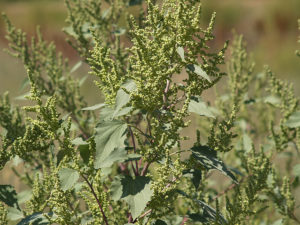September 02, 2014 | Black & Kletz Allergy
 As summer draws to a close and schools reopen across our region, most of us look forward to cooler days and fall colors. But if you are one of several million Americans who suffer from “Hay Fever” (“seasonal allergic rhinitis,” as it is more accurately named) to ragweed, the rising levels of pollen from ragweed are sure to increase your misery due to your allergic reaction to these pollen grains.
As summer draws to a close and schools reopen across our region, most of us look forward to cooler days and fall colors. But if you are one of several million Americans who suffer from “Hay Fever” (“seasonal allergic rhinitis,” as it is more accurately named) to ragweed, the rising levels of pollen from ragweed are sure to increase your misery due to your allergic reaction to these pollen grains.
Though many weeds like Pigweed, Mugwort/Sagebrush, Cocklebur, and Russian thistle pollinate in the fall, Ragweed (species Ambrosia) is the most common and predominant allergen in our geographical area. Each plant can produce up to one billion pollen grains per season, and these can remain airborne for several days and travel hundreds of miles from the site of origin. In the Washington, DC metropolitan area, the ragweed pollen usually starts appearing in the air in mid-August. The pollen counts gradually increase and peak in early September and subside after the first frost which is usually in late October. Many scientists believe that rising temperatures and an increase in atmospheric carbon dioxide (CO2) levels may prolong the ragweed season.
When a person who has been previously sensitized to a particular pollen is exposed to that pollen in the air, the proteins trigger specialized cells in the immune system to release excessive levels of histamine and other chemical mediators which are responsible for various allergic symptoms, some of which are listed below:
- Excessive sneezing
- Itchy, red, puffy, watery eyes
- Persistent runny nose
- Nasal stuffiness, blockage, or congestion
- Itchy throat and post-nasal drip leading to a dry cough
- In asthmatic individuals, the pollen can also induce flare-ups of wheezing, chest tightness, cough and/or breathing difficulty.
In ragweed sensitive people, eating fresh fruits and vegetables like melons (cantaloupe, honeydew, watermelon, etc.), cucumber, zucchini, kiwi, and bananas may cause itching and tingling of mouth, tongue, and throat. This condition is called “pollen-food allergy syndrome” or “oral allergy syndrome” and is due to cross-reacting proteins in the pollen and fresh fruits.
A few avoidance measures can reduce the exposure to pollen and the suffering:
- Minimize outdoor activities in the early morning hours when the pollen counts tend to be the highest.
- Keep the windows at home and in automobiles closed and use air-conditioning.
- Shower to remove pollen from the skin and hair after coming indoors and wash clothing.
- Nasal irrigation can wash the pollen and irritants from nasal passages.
If the symptoms are bothersome, several medications like antihistamines (available in pills, liquid, nose sprays and eye drops), decongestants (pills and liquid), and corticosteroids (nasal sprays, pills, liquid), either alone or in combination may offer considerable relief. To be optimally effective, the medicines are best started a few days before the onset of the active season. For many people with moderate to severe sensitivity, allergy immunotherapy (also referred to as “allergy shots,” will cause a desensitization to that pollen, which in this case is ragweed pollen) will offer the most effective long-term relief from the symptoms and can reduce or eliminate the need for medications.
The physicians and Washington, DC allergy doctors at Black and Kletz Allergy practice in DC and northern Virginia have several decades of experience and expertise in managing ragweed sensitive patients and are committed to provide the most up to date and evidence based treatment options in a patient-friendly environment.












